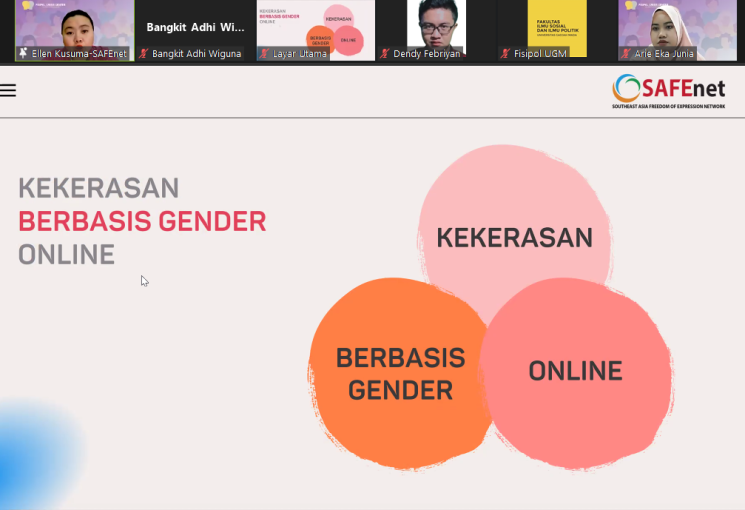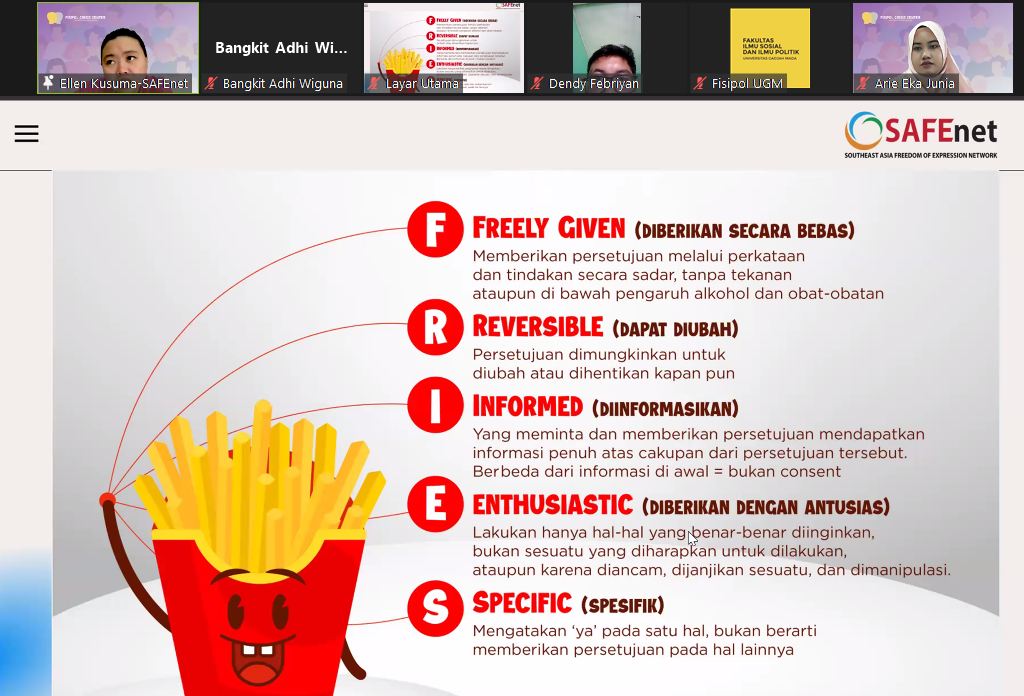
Yogyakarta, July 26th 2022—To celebrate the third anniversary of Health Promoting University (HPU) Fisipol UGM, Fisipol Crisis Center held a webinar titled “#GetSafeOnline : How to Prevent and Handle Online Harassment” on Tuesday (26/7). The webinar talked about preventing Online Gender Based Violence (OGBV) which stems from the fact that OGBV cases are rising in the digital era. Desintha Dwi Ariani, a lecturer in Fisipol UGM Sociology Department and Ellen Kusuma, the Head of Digital At-Risks SAFEnet Subdivision were the speakers.
To start the discussion, Desintha said that OGBV in Indonesia is rising and it is discussed more. “The data from Women National Committee 2020 shows that OGBV is a new form of sexual violence that appears during the Covid-19 pandemic,” Desintha said. The appearance and rise of OGBV cases are due to the use of the internet in the midst of the Covid-19 pandemic.
A year later, OBGV cases kept rising in Indonesia. According to Desintha, The data from Women National Committee 2021 found that there were 940 cases of OGBV. Meanwhile, the Indonesian Legal Aid Foundation shows that there were 307 cases, “The forms of the violence vary, starting from objectifying to degrading comments,” Desintha said.
Replying to Desintha, Ellen said that OGBV happens because of the lack of personal data protection in social media in Indonesia. “It’s a shame because the data that is uploaded to social media is interconnected. Our digital footprint can stay forever, it can even be manipulated by other people” Ellen said. That is why OGBV perpetrators can have access to victim’s data freely.
Another factor that makes OGBV cases rise is the narrow perspective used to analyze OGBV. “Violence in OGBV is usually seen as only physical violence. Meanwhile, online violence is not seen to fit into the categorization of violence and only happens online,” Ellen said. That point of view is harmful because it does not see that online violence also harms the mental state of victims, and OGBV also can be done through text messages.
The strength of patriarchy in Indonesia, as explained by Desintha, also helps increase the case of OGBV. Patriarchy is also normalized by heteronormativity, a norm that focuses on gender expression, role, and identity. “Heteronormativity makes the many forms of violence done by men seen as normal because it is a form of expression of masculinity,” Desintha said.
One of the participants of the webinar, Dendy Febrian, said that his partner has experienced OGBV. “One of my colleagues got some comments with a sexist tone. It made her uncomfortable in expressing herself on social media,” Dendy said.
Not only Dendy, another webinar participant, Yanuar Indriyanto, also said that the child of his colleague experienced OGBV. “The child of my colleague experienced intimidation on social media. The parents were overwhelmed in handling the child’s emotional state after the event,” Yanuar said.

Several things can be done to fight OGBV. Desintha reiterates the importance of doing preventive actions in fighting OGBV. “One of the ways to prevent OGBV is by increasing society’s awareness on issues of sexual violence,” Desintha said.
Ellen also gave several tips on what to do when we are faced with OGBV. First, we need to take a screenshot or save the URL of the event. Second, we need to map out the risks that might arise due to OGBV. Third, we need to assess the emotions and wants of OGBV victims. Four, we need to create a timeline of the harassment. It does not need to be too detailed as long as it shows the outline of the harassment that happened. Fifth, we need to report the OGBV case to the police. “The police might not have the best track record in handling OGBV cases so far. However, strict legal handling of OGBV cases is still needed so that the perpetrator can feel a deterrent effect,” Ellen said.
